Project News
2018-09-20
The first National Seminar was held
As the start of the Pilot Site Activity, as we held the 1st Thai National Seminar on 20th July 2018. The attendants consisted representatives from the projects Main Sites, Potential Settings, and other relating organizations which totaled 145 attendants. The purposes of the seminar were to officially announce the launch of the S-TOP Project along with its detailed activities which help create a common understanding and provide an opportunity for analyzing the current situation of each sites.
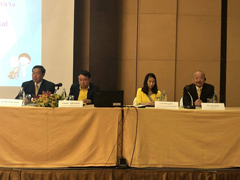 Representatives for opening
Representatives for opening
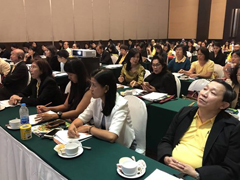 145 attendees including 5-7 representatives from each site
145 attendees including 5-7 representatives from each site
The morning session started with a guide of the S-TOP Project Outline followed by presentations about the policies from related central government agencies that are involved to the S-TOP Project. In addition, we invited lecturers from Sirindhorn National Medical Rehabilitation Institute, Songkhla Province, and Saraburi Province whom are working on "advance Intermediate Care and Seamless Care", which their contribution to the seminar became a great learning opportunity for the participants.
Dr. Wanna Angkasuwan from Hat Yai Hospital in Songkhla Province stated to the S-TOP sites "We faced personnel and budget shortage, however we managed to implement Intermediate Care enabling cooperation between hospitals and the community. As a result, the ADL (Activities of Daily Living) of many patients improved due to receiving proper rehabilitation at the appropriate time".
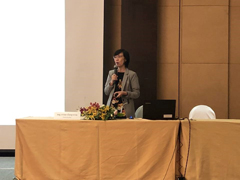 Dr. Wanna Angkasuwan of Hat Yai Hospital
Dr. Wanna Angkasuwan of Hat Yai Hospital
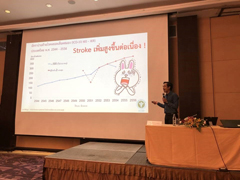 Dr. Suphasilp Jumpanak of Saraburi Hospital
Dr. Suphasilp Jumpanak of Saraburi Hospital
We held a group work session in the afternoon to analyze the "Stakeholder and Current Situation of Intermediate Care and Seamless Care. While on the topic of stake holder analysis the participants listed out all the stake holders in providing Intermediate Care and Seamless Care, whether they were health care providers or social service provider. For example, from the health provider side, there were acute hospital and community hospital and on the social provider side there were the Tambon Health Promotion Hospital, Tambon municipality office, and staffs from day care center who would provide services in form of home health care and support in daily life. Moreover, the participants discussed what role each stakeholder was responsible for in providing IMC and seamless care and what was the relationship between each stakeholder.
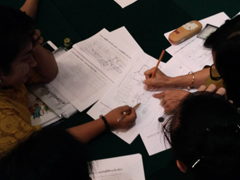 Phase of Group Work Session 1
Phase of Group Work Session 1
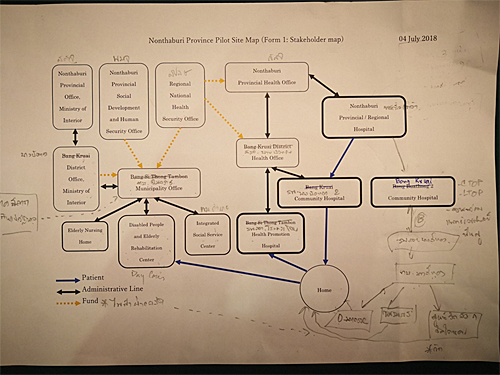 Practice of Stakeholder Mapping of the site
Practice of Stakeholder Mapping of the site
On the topic of Situation Analysis of Intermediate Care and Seamless Care, the prominent challenge in majority of the sites is the shortage of rehabilitation personnel. We learned that the different sites effortlessly came up with ingenious methods and cases to overcome manpower shortages by instructing relevant staffs and persons the knowledge and skill on rehabilitation so that they may be carried out.
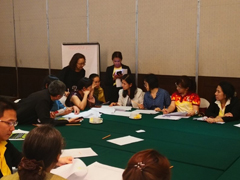 Phase of Group Work Session 2
Phase of Group Work Session 2
The seminar ended with presentations from each site on their analysis. Even with the time constraints, it was a good start for site activities because we receive positive comments from the participants, such as "It was nice to share information and discuss with different sites", and "I want to utilize and implement the examples that are introduced at the seminar today in the area where I am responsible".
Our next goal is to visit each site to discuss and finalize the "Stakeholder Analysis" and "Situation Analysis in Intermediate Care and Seamless Care". The following goal is to provide training on "Introduction of Intermediate Care and Seamless Care service" in Japan, in order to design the "Activity Plan" that the sites need to accomplish.
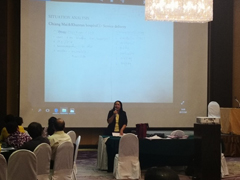 Presentation of Practice Results by each site
Presentation of Practice Results by each site
- About JICA
- News & Features
- Countries & Regions
- Our Work
- Thematic Issues
- Types of Assistance
- Partnerships with Other Development Partners
- Climate Change / Environmental and Social Considerations
- Evaluations
- Compliance and Anti-corruption
- Science and Technology Cooperation on Global Issues
- Research
- JICA Development Studies Program / JICA Chair
- Support for the Acceptance of Foreign HRs / Multicultural and Inclusive Community
- Publications
- Investor Relations
